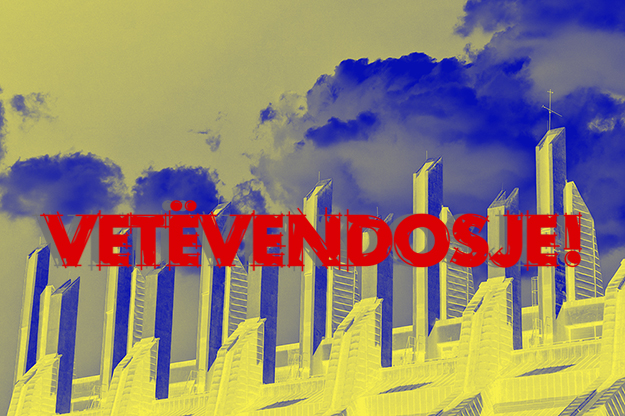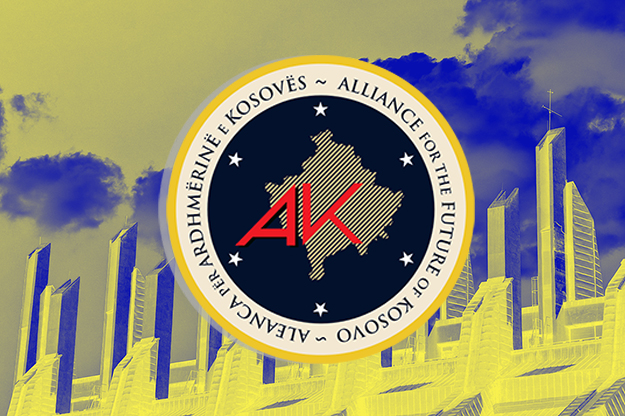With five days left until voting day, election fever is in full swing. Hyperbole and ambitious promises dominate the discourse, with 24-hour news coverage jumping from interview to interview, and topic to topic.
In this series, K2.0 is taking a step back from all that. Building up to election day on June 11, we’re taking some of the big issues facing Kosovo today, and looking into solutions offered by each of the five Kosovar Albanian political parties represented in the Assembly during the last parliamentary term; their programs, their manifestos, their policies.
Kosovo’s cultural scene has helped represent the country in a positive light across the globe, with its representatives picking up international awards in the arts. However, these successes have often come in spite of, rather than due to, state support.
The paradox is perhaps best demonstrated by the world of Opera. In recent years, Kosovo born opera singers like Rame Lahaj and Elbenita Kajtazi have performed in some of the most acclaimed venues around the world, including the Royal Albert Hall in London, the Deutsche Oper in Berlin and the Paris National Opera. But in Kosovo, there is still no venue to watch these stars perform.
As early as 2006 a site was allocated adjacent to the Technical Faculty of the University of Prishtina, where an Opera and Ballet Theater was due to be constructed. A 1 million euro excavation project began on the site in 2010, but it has remained an open hole ever since, with the only singing there performed by a choir of frogs.
In regard to funding, the Ministry of Culture, Youth and Sport has often been at the back of the queue for the state budget. In 2008, the year Kosovo declared independence, just 1.05 percent of the state’s budget went to the Ministry. This year, that figure shot up to it’s highest total, 2.34 percent, though the Department of Culture received less than 8 million euros of the roughly 33.5 million euro budget. Since 2012, the Department of Sport has been allocated around 50 percent of the Ministry’s budget, leaving the Departments of Cultural Heritage, Youth, and Culture to divide the rest.
The people leading the Ministry have also often left much to be desired, with two former Ministers facing investigations by the State Prosecutor, over allegations of misuse of power. Ministers have also been criticized by members of the artistic community, who have complained of neglect and politicized appointments to cultural institutions. They also haven’t always seemed the most invested in culture. Deputy Minister of Culture in the last parliamentary term, Rexhep Hoti, was seemingly unaware of who artist Sislej Xhafa was, despite his participation in this year’s Venice Biennale being supported by the Ministry.
A well functioning Ministry of Culture, Youth and Sport is crucial to the country, and the effects of its struggles can be wider reaching than might be expected. A recent study by the Kosovo Center for Security Studies identified the role of the Ministry of Culture, Youth and Sports as crucial to preventing Islamic extremism in the country, identifying improving culture and sports facilities as a key step.
Work on preserving cultural heritage is another area that remains very concerning. After Kosovo’s membership application to UNESCO was rejected, civil society highlighted that the failure was partly due to Kosovo’s institutions still being weak on cultural heritage protection, and urged the government to make it a national priority. The results of this can be even more disastrous than failure to join international organizations. Last year, a 3-year-old girl, Xheneta Gashi, was killed in Prizren when the roof of a house preserved under the Cultural Heritage list fell on her after heavy rain.
How can the state work to provide a rich cultural life for its citizens, while protecting the cultural artefacts left behind by previous generations? K2.0 scoured the five parties’ literature, and contacted their members to find out.

Democratic Party of Kosovo (PDK)
PDK led the Ministry of Culture, Youth and Sports in the government between 2011-14, with Memli Krasniqi serving as minister. During this time, PDK focused policies achieving what they describe in their 2014 program, the “New Mission,” as ‘cultural diplomacy’: sending Kosovar artists to various cultural events across Europe.
The artists were funded through the Ministry’s Department of Culture, whose budget increased during Krasniqi’s tenure, from 4 million euros in 2011 to 6.3 million euros in 2014. However, the Department was not always the primary beneficiary of a significant increase to the Ministry’s budget. In 2012 and 2013, the Department of Culture received considerably less of the Ministry’s budget in percentage terms, with more funds being allocated to sport.
During the 2014 election campaign PDK promised to double the budget of the Ministry, outlining an increase to over 40 million euros in their New Mission program. PDK entered into coalition government with LDK in the next parliamentary term, with their partners running the Ministry for the entire duration. While the budget of the Ministry did rise to around 33.5 million euros in 2017, it still did not reach PDK’s target of over 40 million.
K2.0 contacted Krasniqi, asking how PDK would set out the budget for Culture in the event the party would form the upcoming government. While Krasniqi acknowledged K2.0’s enquiries, he informed us he would be unable to reply at this time.
The previous LDK-PDK coalition government was also heavily criticized for the politicization of cultural institutions. In 2014, Valdet Avdiu became the general director of the National Theater of Kosovo. The appointment sparked a fierce reaction from the artistic community in Kosovo, due to Avdiu’s links with the PDK leadership. K2.0 asked Deputy Minister of Culture, Youth and Sports in the last parliamentary term, and PDK candidate for the Assembly, Rexhep Hoti, how his party would ensure that appointments to the cultural institutions are free from politics, but received no response.
The New Mission program also prioritized the building of a contemporary arts museum, the renovation of the National Theater and the construction of the Opera and Ballet Theater, promises that have been repeated in PDK’s literature for this year’s election entitled “A New Beginning.”
PDK’s 2011-14 administration failed to construct the Opera and Ballet Theater due to a lack of funds, and an explanation as to where these funds would be sourced from is missing from this year’s literature. K2.0 asked Hoti about the concrete plans PDK would pursue to make the Opera and Ballet Theater a reality in this term but received no response. PDK also declined to participate in this week’s debate on cultural policies hosted by Kallxo.com.
The “New Beginning” platform also promised to establish both the “Museum of Peace” and a further “Museum for the Kosovo War of Liberation.” However, no details on how to make these projects feasible financially are included. The platform also outlines some policies regarding cultural heritage, including establishing a new inspectorate and increasing the budget for restorations and archaeological digs.
However, the party’s record in local governance hasn’t always had the most success with restoration. PDK run the municipality of Prizren, under mayor Ramadan Muja. Members of Civil Society, including those engaged in protection of cultural heritage like Hajrulla Ceku from the Ec Ma Ndryshe NGO have called for the resignation of Muja due to the “degradation” of the city, which PDK has referred to as “its own Jerusalem.”

The Democratic League of Kosovo (LDK)
LDK have led the Ministry of Culture, Youth and Sport for a total of 14 years since the war in 1999, the only break in power coming between 2011-14. Of the six LDK Ministers, two — Astrit Haraqija and Valton Beqiri — have been indicted by the Special Prosecutor for misuse of power.
In 2012, after Haraqija and Beqiri had finished their mandates, the two former ministers were accused of signing illegal contracts with two film companies, and damaging the budget of Kosovo. Last week, the Appeals Court released both men due to an appeal based on the length of time after the crime the indictment had been filed.
LDK’s most recent minister was Kujtim Shala, who served in the last parliamentary term. Shala has been criticized by representatives of different independent cultural festivals, including Ilir Bajri from Jazz Festival Prishtina, for not supporting independent artists in their work. A lack of investments in film and theater have also been criticized, to the extent that National Theater actors recently started protesting because of poor working conditions.
K2.0 contacted outgoing minister Kujtim Shala to ask about LDK’s investment plans in the field of culture and concrete plans regarding the construction of the much promised Opera building. We received no response. However, on June 5, Faton Peci, an LDK candidate for the Assembly in the upcoming elections, appeared on a debate on cultural policies hosted by Kallxo.com, and mentioned the Opera and Ballet Theater.
Peci blamed the Municipality of Prishtina for the failure to construct the Theater, alleging that the Municipality did not allocate the land that was required because the Ministry planned to name the Opera after Ibrahim Rugova. Vetevendosje representatives in the debate denied these allegations, stating that such a request was never filed with the Municipality.
K2.0 has also managed to get a copy of LDK’s governance program, which has been compiled alongside their coalition partners, the New Kosovo Alliance (AKR) and Alternativa. At the end of this program, in chapter 10 which covers Culture, Youth and Sports, the coalition offer seven promises regarding culture. The first states that “Cultural and identity values of the citizen, will be at the center of attention…” without any further explanation. Another point assures “good governance (the European concept of governance in culture)”; again with no further explanation.
More clearly, the party also promise “a continuous increase of the budget of public cultural institutions, cinematography institutions and publishing houses; and financial support for renovating culture and arts buildings in municipalities,” though the exact figures are not mentioned. K2.0 asked how much LDK would plan to invest in culture but received no response.
However, in the debate, Peci defended LDK’s record on investing in culture, pointing out that in 2017 alone, the budget of the Ministry was increased from 19 million euros to 33 million; a 65 percent increase. “The 1.9 million euros that were allocated for cultural heritage, we’ve increased to 5 million,” he stated. “We’ve also advanced legislation for culture, cultural heritage and sports, and have compiled strategic documents that have managed to depoliticize cultural institutions,” Peci added, though did not reveal details to which institutions he was referring.
He promised that LDK would continue to invest in physical infrastructure and cultural facilities at a central and municipal level and announced that they have started to build the Museum of Natural Arts in Fushe Kosove.
LDK’s program also promises to establish two museums, an Archaeological Museum and Ethnological Museum. An Ethnological Museum has been in operation in Prishtina since July 2006, as part of the National Museum of Kosovo. K2.0 asked outgoing minister Shala to explain what they mean with this “establishment,” but received no reply.

Vetevendosje (VV)
Saranda Bogujevci, the former head of the Department of Culture within the Municipality of Prishtina and a Vetevendosje candidate for the Assembly told K2.0 that the first priority of the Ministry of Culture, Youth and Sports under a Vetevendosje government would be the construction of the Opera and Ballet Theater. This policy was also highlighted in the ‘40 priorities of a Vetevendosje government’ outlined by Albin Kurti and Shpend Ahmeti last month.
“We aim to complete the design of the building and locate a site for the construction of the Opera Theater in the first year, as well as allocating funds for the project,” Bogujevci told K2.0. The promise seems to suggest that Vetevendosje would discard work made towards the construction of an Opera and Ballet Theater done by previous administrations, and reshape the project, starting from scratch.
According to Vetevendosje’s 2013 Governing Alternative program, people of all ages across Kosovo need to have easy and equal access to cultural and artistic experiences, and be given the possibility of expression through arts and culture.
In order to achieve this, Bogujevci told K2.0 that a Vetevendosje government would work closely with municipalities on projects that support culture. She highlighted that this would be done through infrastructure projects: the renovation of cultural centers, investing in public cinemas, the functionalization of theaters that have been damaged, regular investment in libraries and funds for books, and the construction of recreational spaces for new artists. She added that Vetevendosje would also utilize unused public properties and transform them into creative spaces with combined finances from the budgets of the ministry and municipalities, as well as from donations.
However, the Department of Culture within the Municipality of Prishtina, run by Vetevendosje, has often been criticized by the artistic community and other political parties for their inaction in pushing forward capital investments, as well as for allocations of budget and the lack of a strategy for cultural life in the capital. The Department of Culture has been overseen by three heads of department within four years, with Bogujevci being the second.
Vetevendosje’s Governing Alternative also envisages the creation of a National Agency for the Development of Arts that would create a fund dedicated to artistic endeavors and aid the development of new artists. According to the platform this fund would not be subsidized by the Ministry of Culture. Explaining how it would be financed, Bogujevci suggested finances provided by international donations, philanthropists and the budgeting capacities of Kosovo, which, according to her, have until now been utilized only for giving “special support” to a few select projects.
In regard to budget, Bogujevci stated that Vetevendosje plan an increase in support for culture, with funds freed up by spending less on “capital projects,” including highways. On the Department of Cultural Heritage, Bogujevci made a specific promise to increase the budget by 100 percent in the first year of governance.
She further stated that the party would improve the legal framework protecting cultural heritage in the country, using guidelines set out in the 1964 Venice Charter, that provides international advice on the preservation of cultural heritage. The party also outline the creation of a new body within the Kosovo Council for Cultural Heritage, intended to design and implement management policies for Kosovo’s UNESCO World Heritage Sites, as well as the preparation of new applications to the list, including the Historic Center of Prizren.
Another Vetevendosje policy on cultural heritage involves the return of cultural heritage artefacts, as well as an archive documenting Kosovo’s cultural heritage, from Serbia, though the party do not outline how this would be achieved. Bogujevci stated that the party also wish to revoke the rights for religious communities to manage cultural heritage sites, though the specifics of who this would include were not mentioned.
Bogujevci also stated the party’s intention to apply to UNESCO to gain further preservation rights, and transfer the status of UNESCO’s ‘Medieval Monuments in Kosovo’ (which covers four Serbian orthodox sites) to being registered as part of Kosovo’s cultural heritage.

Alliance for the Future of Kosovo (AAK)
In AAK’s 15 page political program from 2014 there are no concrete steps or projects which relate to the field of culture, and public statements made by AAK members regarding culture have also proved hard to find.
K2.0 contacted AAK’s media office, as well as outgoing deputy Teuta Haxhiu, to ask a number of questions, including on why culture is not part of their political program, which institutions AAK foresees supporting and focusing on, and how big the budget for the Ministry of Culture, Youth and Sport should be. We also made enquiries regarding the construction of the Opera and Ballet Theater, the politicization of cultural institutions, and initiatives regarding cultural heritage. We received no response to our questions.
However, Arber Vllahiu, a new member of AAK who joined the party two weeks ago, was chosen by his party to be a part of Kallxho.com debate show on June 5, in which policies regarding culture were discussed. Vllahiu concluded that Kosovo is lacking as a state, and that one of the fields in which Kosovo has many deficiencies is that of culture. He highlighted that the budget for culture is insufficient to cover the needs of the country’s cultural requirements. Vllahiu asserted the need to build stadiums, cultural spaces for young people, theaters, cultural ensembles, and other issues related to cultural heritage. However, Vllahiu did not mention any exact figures regarding the budget and the steps that his party believe must be taken in order to fulfil these needs.
Another issue that was discussed was the utilization of public art spaces exclusively by public institutions, and the demonopolization of these spaces for use in different arts fields. Vllahiu said that it is important to depoliticize all cultural institutions and to “utilize young people’s potential so as to facilitate culture and the arts in general.”
Discussing cultural heritage, following a question on which concrete projects were planned for preserving heritage, Vllahiu said that all facilities that are classified as cultural heritage would be renovated, conserved and preserved, because up until now, these facilities have been left untreated and are in a state of ruin.
However, his party don’t always have the best record in historical restorations. In 2012, an AAK run municipality in Gjakova, led by then-mayor, Pal Lekaj, oversaw a controversial renovation project on the city’s Carshia e Vjeter (old marketplace), which was on the cultural heritage list for temporary protection. Members of civil society and even the Ministry of Culture, Youth and Sports reacted against the project at the time, describing it as “a very heavy intervention on cultural heritage.”
As part of the renovation work, historic stones were removed and substituted with marble from Malishevo. In addition to comments made by Ministry officials, citizens also described the work as a direct transformation of the identity of Carshia e Vjeter. The Municipality of Gjakova defended the work, stating that the stones were only removed temporarily, and were being preserved in a “safe place,” for use in future restoration projects.
Later it was discovered that the stones were left beside a small river outside the city. The Ministry gave the order to stop the restoration work and to return the stones, giving the justification that the restoration had damaged cultural heritage.

Initiative for Kosovo (Nisma)
In their political program, Nisma uses the term ‘culture’ only a handful of times, mostly in sentences such as “lies have become a political culture,” “laws are made by the uncultured,” and “the poor environments of our cultural life.” The only time the word culture is used to refer to the field of culture is in the following sentence: “Before this, our vision is to have an economy, market, education, culture, health care system and tourism without boundaries in all of our national territory.”
K2.0 could not find any indications given by Nisma officials on their views on culture in the country prior to this election campaign. K2.0 contacted the communication office of Nisma, asking about the lack of culture in its political platform, what policies Nisma envisage regarding culture, and if the party aims to increase the budget for the Ministry of Culture, Youth and Sports. We also asked how the party sees the politicization of cultural institutions, about the construction of the Opera and Ballet Theater and Nisma’s main ideas on cultural heritage preservation. We received no response.
However, the party was represented by former actor, turned politician, Sunaj Racaj on the June 5 Kallxho.com debate on cultural policies. Racaj said that although the budget of the Ministry of Culture has been increased by 65 percent, this has not been noticed at all in the country’s cultural establishments, especially among the artistic community, to which he belongs. However, he did not offer any concrete details or figures related to the budget that his party foresees for the Ministry of Culture.
Racaj highlighted the many issues that artists and the creative community face in the country, stating that his involvement in politics is an attempt to “depoliticize culture by entering politics.” According to him, the politicization of cultural institutions is one of the most fundamental issues that culture faces in the country, and is one of his party’s main priorities. He mentioned politicized appointments to key positions of the boards at these institutions, but did not offer any details as to how they would be depoliticized, or what mechanisms Nisma plans to use to achieve this objective, but did state that “the time has come for creators to find opportunities and change the situation of culture and cultural institutions through political parties that provide space.”
Racaj also spoke about who he thinks should lead the Ministry of Culture. He said that the post requires a person that makes improvements to cultural infrastructure, enables Kosovo’s engagement in international cultural institutions, and does not appoint party militants as board members of institutions like the National Theater and the Kosovo Cinematography Center.
When asked about which independent mechanisms the Ministry of Culture should use and support so as to solve issues in this field, Racaj stated that “there are initiatives, associations and organizations that must be supported,” and insisted that the important thing is to have professional people lead this sector; unlike we’ve seen in the past.K
For more on where Kosovo’s political parties stand, watch K2.0’s video on ideology, and read previous articles on election issues, including employment, education, the army, gender equality, health, sports and LGBTI rights.

